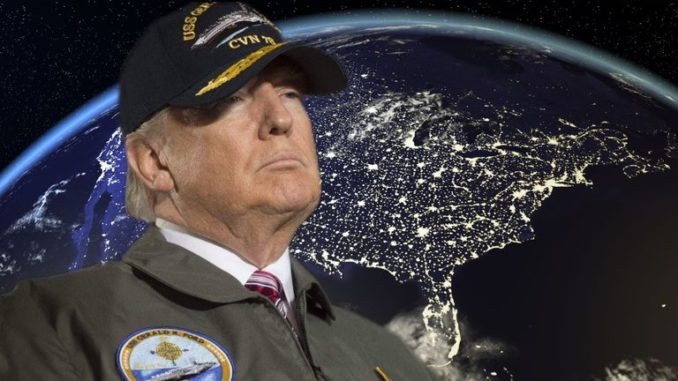
The Summit sends NATO into space –
at exorbitant cost
Manlio Dinucci
On 4 December, the North Atlantic Council of heads of
State and government met in London to celebrate the 70th anniversary of NATO,
defined by Secretary General Jens Stoltenberg as “the most successful alliance
in History”.
An undeniable “success”. Since it demolished the
Yugoslav Federation in 1999 by acts of war, NATO membership has risen from 16
to 29 countries (30 if it now covers Macedonia), and expanded Eastward to the
borders of Russia. “For the first time in History - claims Stoltenberg- we now
have combat-ready troops in the Eastern wing of our Alliance”. But the North
Atlantic Treaty Organisation has gone beyond that, by extending its war-making
operations as far as the Afghan mountains and across the deserts of Africa and
the Middle East.
Currently, the Great Alliance is setting the bar even
higher. At the London Summit - pre-announced Stoltenberg - the leaders of the
29 member countries “will recognise that space is our fifth field of
operations”, to be added to the land, maritime, aerial and cyber-spatial
fields. “Space is essential for the success of our operations”, emphasised the
Secretary General, hinting that NATO intends to develop a space-based military
programme. He obviously gave no details, but said that NATO has signed a first
contract of one billion dollars to modernise its 14 AWAC aircraft. These are
not simple radar planes, but flying command centres, built by the US company
Boeing to manage battles via spatial systems.
Without any doubt, almost none of the European leaders
(for Italy, Prime Minister Conte), who, on 4 December “will recognise that
space is our fifth field of operations”, knows nothing of NATO's spatial
military programme, prepared by the Pentagon and by the European military
summits tied to the largest aero-spatial industries. And even less of these
programmes is known by European parliaments which, as in Italy, accept all of
NATO's decisions – under US command – without a thought for their
politico-military and economic implications.
So NATO is going to launch into space in the wake of
the new Space Command created by the Pentagon last August with the goal, as
declared by President Trump, of “ensuring that American domination of space
will never be threatened”. Trump then announced the successive constitution of
the US Space Force, with the mission of “defending vital American interests in
space, the next field of war combat”. Russia and China accused the USA of
opening the way to the militarisation of space, and warned that they have the
capacity of responding. All this maximises the threat of nuclear war.
Even if we do not yet know NATO's spatial military
programme, one thing is certain – it will be very expensive. At the Summit,
Trump will exert pressure on the European allies in an attempt to force them to
expand their military spending to 2% or more of their GDP. So far, 8 countries
have done so - Bulgaria (which raised its contribution to 3.25%, just below the
USA's 3.42%), Greece, the United Kingdom, Estonia, Romania, Lithuania, Latvia
and Poland. The others, while remaining below 2%, have agreed to the increase.
Dragged along by the enormous USA expenditure - 730 billion dollars in 2019,
more than ten times that of Russia – NATO's annual military budget, according
to official data, has risen to beyond 1,000 billion dollars. In reality, it is
higher than that indicated by NATO, because it does not include various posts
of a military character – for example that of US military weapons, which is
listed not to the Pentagon but to the Department of Energy.
Italy's military spending, which has risen from 13th
to 11th place in the world, has now in real terms reached approximately 25
billion Euros annually. Last June, the Conte government added 7.2 billion
Euros, supplied by the Ministry for Economic Development, for the purchase of
weapons systems. In October, during a meeting with NATO's Secretary General,
the Conte II government agreed to increase this sum durably by about 7 billion
Euros as from 2020. (La Stampa, 11 October 2019).
At the London Summit, more billions of Euros of public
finances will be required from Italy in order to sponsor NATO's operations in
space, while we cannot find the money for our own security and rebuild
collapsed viaducts.
il manifesto, 03 December 2019
Translator: Pete Kimberley
Manlio Dinucci
DECLARATION OF FLORENCE
FOR AN INTERNATIONAL FRONT NATO EXITDANSK DEUTSCH ENGLISH ESPAÑOL FRANÇAIS ITALIANO NEDERLANDS
PORTUGUÊS ROMÎNA SLOVENSKÝ SVENSKA TÜRKÇE РУССКИЙ
PORTUGUÊS ROMÎNA SLOVENSKÝ SVENSKA TÜRKÇE РУССКИЙ
Manlio Dinucci
Geographer and geopolitical scientist. His latest books are Laboratorio di geografia, Zanichelli 2014 ; Diario di viaggio, Zanichelli 2017 ; L’arte della guerra / Annali della strategia Usa/Nato 1990-2016, Zambon 2016, Guerra Nucleare. Il Giorno Prima 2017; Diario di guerra Asterios Editores 2018, Premio internazionale per l'analisi geostrategica assegnato il 7 giugno 2019 dal Club dei giornalisti del Messico, A.C.

No comments:
Post a Comment
Note: Only a member of this blog may post a comment.